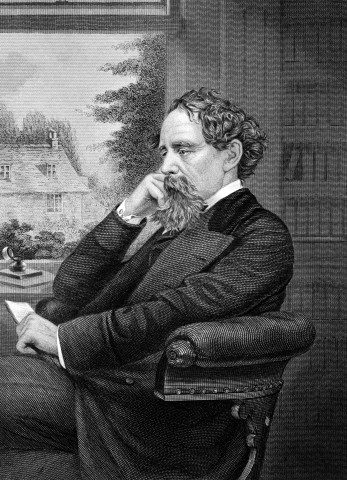Charles Dickens and Liverpool

In the spring of 1844 – barely three months after the publication of his novella A Christmas Carol – Charles Dickens was invited to preside over a soiree at the Liverpool Mechanics’ Institution.
It was what one observer described as a ‘brilliant, delightful and attractive affair’. The members were so excited to have the great author, still only 32, in their presence they even commissioned a special portrait to mark the occasion.
Dickens thanked the assembled revellers for his reception, finishing by namechecking one of his latest – and soon to be best-known – characters, saying: “Let me for once quote myself, and as Tiny Tim says, ‘God bless every one of us’.”
Incidentally, it wasn’t just members of the Mechanical Institution who were charmed by their guest. Dickens was taken by the teenage Christiana Weller who sang for the company, and later his friend Thomas Thompson married her.
A quarter of a century later, Liverpool staged another evening in Dickens’ honour, this time a splendid banquet at St George’s Hall.
Six hundred of Liverpool’s great and good assembled to pay homage to the famous “litterateur”.
Fellow writer Anthony Trollope was among the throng, and the top table boasted a silver fountain from which flowed an endless stream of fragrant rosewater.
The dinner proved to be the final chapter in a 30-year association with Liverpool, and one which saw the writer visit in many roles - as a traveller, actor, researcher and speaker.
In 1842 he used the Adelphi as a comfortable staging post before crossing the Atlantic, in early January, in the Cunard paddle steamer Britannia; a precarious voyage that included running aground in stormy seas off Nova Scotia.
The author took part in a series of amateur theatrical performances during the late 1840s and early 1850s, both at the Theatre Royal in Williamson Square, and at the Philharmonic Hall where, in February 1852 he was one of the Guild of Literature and Art troupe of players – alongside Wilkie Collins - who performed works including Dickens’ own play, Mr Nightingale’s Diary.
Dickens himself declared the event a triumph, while the Liverpool Mercury described Mr Nightingale’s Diary as “one of the richest and raciest performances we ever witnessed.”
The author returned to the Philharmonic Hall in August 1858 to stage the first of what would become a celebrated – and hotly-anticipated – series of public readings of his work.
And what was the first book he chose to read from at that inaugural event, in the height of summer? A Christmas Carol.
Christmas certainly came to Liverpool more than once that year.
These staged readings moved location in the early 1860s to the newly-built St George’s Hall.
Demand for tickets was so great that at one appearance in 1866, an estimated 3,000 people had to be turned away in what were chaotic scenes.
At other times however, Dickens came as a researcher not raconteur.
In 1860 he visited the Brownlow Hill Workhouse to meet invalided soldiers from the Indian campaign. And in the same year, he enrolled as a special constable with the Liverpool Police Force for a night, patrolling the rough and ready byways of the busy waterfront.
Both trips formed the basis of vivid chapters in his Uncommercial Traveller series – The Great Tasmania’s Cargo, and Poor Mercantile Jack.
Words: Catherine Jones
artscityliverpool.com | @ArtsCityLpool
A Christmas Carol is at the Playhouse, Sat 5 Dec to Thu 24 Dec 2020
Posted in PLAYHOUSE